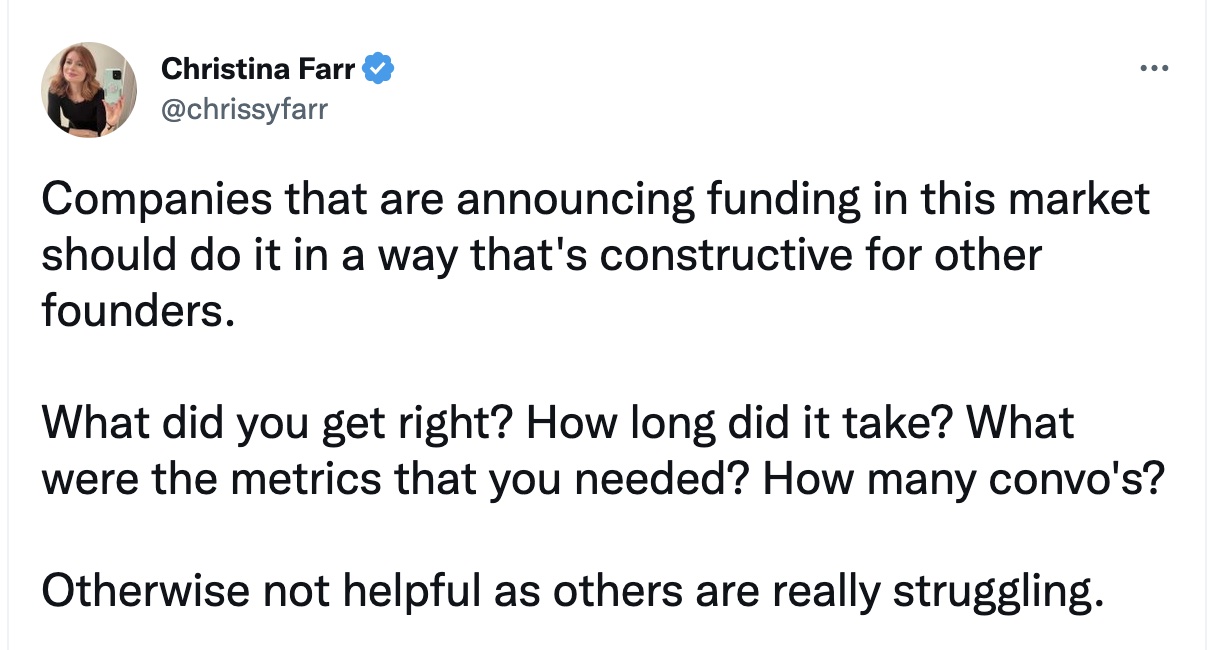Welcome to The Interchange! If you received this in your inbox, thank you for signing up and your vote of confidence. If you’re reading this as a post on our site, sign up here so you can receive it directly in the future. Every week, I’ll take a look at the hottest fintech news of the previous week. This will include everything from funding rounds to trends to an analysis of a particular space to hot takes on a particular company or phenomenon. There’s a lot of fintech news out there and it’s my job to stay on top of it — and make sense of it — so you can stay in the know. — Mary Ann
Hello! It’s my first full week back in some time, and I’m excited. Turns out having COVID helped me get more rest than I have had in a very long while. (Silver linings.)
The week of Thanksgiving turned out to be less boring than I expected — I reported that three of alternative financing startup Pipe’s co-founders were stepping down as the company searched for a “veteran” CEO to take the company to the next level.
For some context, I have been covering Pipe since it raised $6 million in a seed round led by Craft Ventures back in 2019. I have watched it grow over time, in various ways. All the while, I have been in contact with its CEO and co-founder Harry Hurst. So when I got the news that he was planning to leave the company, along with two of his co-founders, I was surprised. This is not a common thing. Co-founders don’t often step down so soon after a company was founded and achieved unicorn status. And it’s practically unheard of for three co-founders to leave at the same time.
After that article published, I was inundated with tweets, messages, and so on…with a number of allegations around “the real reasons” that Pipe’s co-founders were stepping down. Among those rumors were claims that Pipe made roughly $80 million in loans to one or several crypto mining companies. The outfit or outfits have since gone out of business and the $80 million is believed to have been completely written off, these individuals claimed (many of whom said they had “heard” about the events).
To be clear, if we reported on every rumor we heard here at TechCrunch, we’d turn into the “National Enquirer” of the startup world. At the same time, when a reporter is provided with the same information from multiple sources who they know and trust, it is then irresponsible to not follow up on those claims. So that’s what I did.
Ultimately, Pipe denied the claims against it but in that denial, a couple of interesting things came to light. First, the startup’s board — despite its long list of investors — consists of only the three co-founders who are stepping down and one independent director, Peter Ackerson, a general partner at Fin Capital who himself became a VC just three years ago. Second, I found out that once a new CEO is found, that individual will assume Hurst’s seat on the board.
Now, I am not here to “take sides.” I don’t know what truly has, or has not, gone down behind the scenes at Pipe. But regardless, this all struck me as odd. For one, how can a startup that has raised some $300 million and is valued at $2 billion not have a more independent board? Two, why would Hurst — who has been the very vocal frontman of Pipe since its inception — leave the board? Finally, it turns out there is a fourth co-founder, Michal Cieplinski, whose name was notably not mentioned at all when the other three founders’ departures were announced. Apparently, he remains in his role as chief business officer.
For now, I can only report on what I am told. As time goes on, we’ll see if more details surrounding this unusual development emerge.

X1
When pressed, Pipe declined to reveal details around its financials. So perhaps it felt even more refreshing when consumer fintech X1 happily shared details around its revenue in an interview last week. The company was founded in 2020 to offer a credit card to consumers based on their income, rather than their credit score. It launched that credit card to the general public in mid-September after amassing a waitlist of 600,000. While I don’t know how many cardholders the company currently has, I was impressed that it has seen its revenue triple over the past 6 months — from $1 million per month to $3 million per month, giving it an annual revenue run rate of $36 million. Not bad. Not bad at all.
X1 is one of the few fintechs I have covered that opted NOT to raise in 2021. That may have been a very wise decision. Its valuation was not inflated, so after raising $25 million earlier this year in a Series B round, investors clamored to offer it another $15 million earlier this month — at a 50% higher (undisclosed) valuation.
The startup feels low-key in a sector that has been full of hype and chest-beating in recent years. It recently lured away an Apple exec to serve as its chief risk officer, and according to CEO and co-founder Deepak Rao, it’s already conducting audits (others in the space should take note!).
The company is now taking on the likes of Robinhood as it gears up to launch its own investing platform, which will give its cardholders a way to buy stocks with the reward points they earn using its card. It’s a novel concept and we’ll see how it works out. On that topic, one thing I found interesting: FPV Ventures, a venture firm founded by Google Analytics founder Wesley Chan, led X1’s $25 million Series round. Well, Chan was also an early investor in Robinhood. X1 declined to comment on that fact, but it is just one other example of VCs backing startups that very closely resemble others that they have already backed. In a world where companies are constantly evolving and iterating, it shouldn’t be shocking. But it does feel a bit…awkward, to say the least.
Weekly News
Stripe announced it built a fiat-to-crypto onramp. The company described it as “a customizable widget that developers can embed directly into their DEX, NFT platform, wallet, or dApp. Stripe claims to handle all the KYC, payments, fraud, and compliance and that the on-ramp can be integrated “with just 10 lines of code.” Romain goes deeper on the topic here.
Eric Wu, co-founder of Opendoor, stepped down from his role as CEO of the real estate fintech. Carrie Wheeler, who has served as the company’s CFO for just over two years, is taking over the role of CEO. Wu will now serve as president of Opendoor’s new marketplace offering, Opendoor Exclusives. At the time of the launch last month, Wu said: “We’ve designed Opendoor Exclusives to be a new marketplace where you can directly buy and sell a home, without any of the hassle of the traditional real estate model.”
Finextra reported that “Klarna has launched a platform that connects retailers with creators and influencers that can help them reach their target markets. The Creator Platform promises to match retailers with the right influencers and then track performance metrics — including traffic, sales and conversion rates — in real time. Already live in the US, it is now available in all markets in which Klarna operates, providing an additional marketing channel for the firm’s 450,000 retail partners.”
News like this doesn’t exactly bolster the case for fintech. According to the Chicago Sun-Times, “since 2020, more than 3,500 complaints have been filed about San Francisco-based Chime Financial Inc. with the federal Consumer Financial Protection Bureau about closed accounts, unauthorized charges or other issues. Most are marked ‘closed with explanation,’ meaning the company resolved them privately with the customer…Some Chime customers who have complained about sudden account closures were shocked to hear that it could take up to a month to get their money back.”
As reported by the very talented Joanna Glasner, who writes for my former employer, Crunchbase News: “Last year, financial services was the leading sector for venture investment, with at least $131 billion globally going into startups in the space. This year, the industry still ranks among the largest recipients of venture capital funding. However, investment to startups in the space has been dropping every quarter this year, with Q4 likely to be the lowest yet.”
American Express is going deeper on B2B payments. On December 1, the credit card giant launched Amex Business Link. A spokesperson told me this will offer “a new B2B payments solution for network issuers and acquirers to offer to their business customers.” Its goal is to provide “more streamlined, efficient, and flexible ways for businesses to pay each other on the Amex network”
Seen on TechCrunch+
Is FTX’s failure a stress test for corporate credit card startups? As reported by Natasha Mascarenhas: “Ramp recently sent a message to crypto companies using its corporate card services saying that it is significantly lowering spending limits and adding new requirements. Some users were temporarily suspended from spending altogether…While Ramp somewhat backtracked on the changes, its move offers a window into how corporate credit card companies could be stress-tested in the current environment. Brex, Ramp’s biggest competitor, said that there have been no changes to crypto users’ spending limits.”
Of all the venture capital funding invested in 2021, around one in every five dollars went to fintech. But this boom now seems behind us, as global fintech funding activity returned to pre-2021 levels. Worse, fintech didn’t escape the recent waves of tech layoffs, with high-profile companies like Brex, Chime and Stripe making headlines for this disheartening reason over the last few weeks. And yet, fintech startups are still getting founded and funded this year. Of the 223 companies in Y Combinator’s summer 2022 batch, 79 fell more or less into the fintech category. Why are founders and investors still placing bets in fintech and where? To find out more, Anna Heim reached out to fintech-focused VC firm Fiat Ventures.
ICYMI
As reported by Manish Singh: “Shares of Paytm in November slid to an all-time low of 477 Indian rupees ($5.8), a week after the lockup period for early backers of the Indian financial services firm ended last week and mounting concerns of growing competition.”
Sarah Perez reported: “In November, PayPal-owned Venmo rolled out two changes to its peer-to-peer payments app, including the ability to donate to charities through Venmo as well as a redesigned money-sending experience. The latter aims to make it easier to see how much you’re sending and who you’re sending to, while also improving the ability to either pay or request multiple payments at once.”
And here’s some news that inadvertently got left out of the November 20 edition of our newsletter…my apologies (I blame COVID brain!)! Thanks again to Kyle Wiggers for drafting the write-ups.
Block’s Square wants to get into the credit card game — but it’s going the partnership route to get there. The company announced that it’s teaming up with American Express to launch a new credit card targeted at Square sellers on the Amex network. Details were tough to come by at publish time — Square says it’ll reveal more about the card early next year — but the press release suggests that the card, soon available to all “eligible” Square sellers in the U.S., will integrate with Square’s existing services to let cardholders organize their finances and manage cash flow from a single pane of glass.
Fintech startups — startups dabbling in banking, investing, budgeting and payments — remained red-hot this year, with 18% of global venture dollars going to fintechs in Q2 2022. That’s not surprising in light of recent findings from digital analytics company Amplitude, which show that fintech apps and services continued to add new users over the last year, hitting a peak in June and July at 22% higher growth compared to August 2021. The stats align with the results of a 2021 Plaid survey showing that nearly nine in ten Americans now use some kind of fintech app to manage their financial lives. Clearly, the economic downturn aside, fintech is here to stay — and going strong.
With the “buy now, pay later” (BNPL) market on less firm ground than it once was, some of the largest vendors are on the hunt for alternative lines of revenue. Enter Klarna’s price comparison tool, which the BNPL startup is positioning against shopping services like Google Shopping and Shopping.com. Built on top of tech acquired through Klarna’s $1 billion acquisition of PriceRunner earlier this year, the new tool allows users to filter product searches by criteria such as size, color, ratings, availability and shipping options and view historical pricing data, which shows how the cost of the product has fluctuated over time. Klarna earns money by driving traffic and sales for its retail customers.
Speaking of Klarna, CEO Sebastian Siemiatkowski says that the collapse of crypto exchange FTX may encourage financial sector regulation that’ll make it harder for fintech firms to compete against traditional lenders. Speaking to Bloomberg, he said: “I’m a little bit concerned that these debacles that we’ve seen will again inhibit that and continuously prolong the overly large profitability that we’ve seen in the banking industry.” There’s not a ton of evidence to support this, but it’s undeniably true that regulators are preparing to take a long, hard look at crypto specifically after years of legislative inaction. The Washington Post reports that the Treasury Department has placed calls to large crypto exchanges to assess the risks of a broader contagion and congressional committees have readied reviews, including a House inquiry that could see FTX founder Sam Bankman-Fried testify under oath next month.
Fundings and M&A
Seen on TechCrunch
Consumer finance app Djamo eyes Francophone Africa expansion, backed by new $14M round
Taktile raises $20M to help fintech companies test and deploy decision-making models
Bank engagement startup Flourish Fi leans into concept of ‘banks aren’t going anywhere’
Southeast Asia insurtech Igloo increases its Series B to $46M
AirTree and Greycroft return to lead Australian regtech FrankieOne’s Series A+
Seen elsewhere
Neobank for Native Americans raises pre-seed funding
Peter Thiel’s VC fund backs TreeCard, a fintech that plants trees when you spend
Cross-border payments startup Buckzy raises $14.5 million in Series A financing
Intuit to acquire financial health startup SeedFi
Brazilian unicorn Loft denies receiving down round
Tweet of the Week
Former journalist turned VC Chrissy Farr had a notable tweet this week, in which she said: “Companies that are announcing funding in this market should do it in a way that’s constructive for other founders. What did you get right? How long did it take? What were the metrics that you needed? How many convo’s? Otherwise not helpful as others are really struggling.”
I feel compelled to bring this up because the way I cover funding rounds has fundamentally changed from 2021. Let’s be honest — the people usually most interested in reading about a company’s raise are those that either work at, or have invested in, the company itself. In fact, you may be surprised to know that funding-focused articles are rarely among the most read on the TC site. I realized that to continue covering 10 funding rounds a week was not really doing our readers a favor. So these days, I try to focus on companies that (a) are doing something that appears to be really unique or novel and different from existing tech; (b) are willing to share revenue figures or specifics around their financials; (c) have a compelling origin story — say, founders with nontraditional backgrounds or hailed from other high-profile companies or startups; (d) can share specifics and context around their raise and how it came together; and (e) run counter to existing narratives or trends….among a few other things.
Bottom line is we get inundated with pitches. Seriously, you could not even imagine. We have to be super selective about what we choose to cover. Not to mention the fact that by committing to a ton of funding stories, we are leaving less room and time to cover breaking news and write profiles, features or trends and analytical pieces. So, when I say thanks, but no thanks I’m not able to cover your funding round outside of including a mention in my newsletter, please don’t follow up another 10 times. It’s not personal.

Podcasting
Did you know that I record the Equity podcast every week with my wonderful co-hosts and dear friends Alex Wilhelm and Natasha Mascarenhas? You can listen to our latest episode here. Oh, and I’m SO proud to report that Equity was ranked among the top 5% shared podcasts globally on Spotify!
Also, back in September (I don’t think I ever shared this), I was honored to be a guest on Miguel Armaza’s Fintech Leaders podcast. Among the topics we discussed: why I love covering the startup world and some tips on how to pitch your story to tech reporters, the future of tech media, my idea of what good journalism really means…and a lot more! Listen in here.
With that, I will close. Thanks once again for reading/sharing/subscribing. See you next week! Until then, take good care. xoxoxo — Mary Ann
Got a news tip or inside information about a topic we covered? We’d love to hear from you. You can reach me at maryann@prod22.techcrunch.com. Or you can drop us a note at tips@prod22.techcrunch.com. If you prefer to remain anonymous, click here to contact us, which includes SecureDrop (instructions here) and various encrypted messaging apps.






























Comment